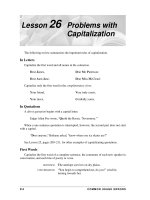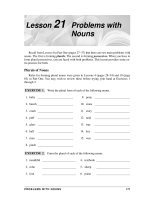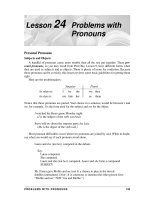Perfect phrases for ESL conversation skills with 2100 phrases perfect phrases series
Bạn đang xem bản rút gọn của tài liệu. Xem và tải ngay bản đầy đủ của tài liệu tại đây (3.27 MB, 185 trang )
PERFECTPHRASES™
for
ESL
ConversationSkills
HundredsofReady-to-UsePhrasesThatHelpYouExpressYourThoughts,Ideas,
andFeelingsinEnglishConversationsofAllTypes
DianeEngelhardt
NewYorkChicagoSanFranciscoLisbonLondonMadridMexicoCityMilanNewDelhiSanJuanSeoulSingaporeSydney
Toronto
Copyright©2013byDianeEngelhardt.Allrightsreserved.ExceptaspermittedundertheUnitedStatesCopyrightActof1976,nopartofthis
publicationmaybereproducedordistributedinanyformorbyanymeans,orstoredinadatabaseorretrievalsystem,withoutthepriorwritten
permissionofthepublisher.
ISBN:978-0-07-177407-9
MHID:0-07-177407-6
ThematerialinthiseBookalsoappearsintheprintversionofthistitle:ISBN:978-0-07-177027-9,MHID:0-07-177027-5.
All trademarks are trademarks of their respective owners. Rather than put a trademark symbol after every occurrence of a trademarked
name,weusenamesinaneditorialfashiononly,andtothebenefitofthetrademarkowner,withnointentionofinfringementofthetrademark.
Wheresuchdesignationsappearinthisbook,theyhavebeenprintedwithinitialcaps.
McGraw-Hill eBooks are available at special quantity discounts to use as premiums and sales promotions, or for use in corporate training
programs.Tocontactarepresentativepleasee-mailusat
McGraw-Hill, the McGraw-Hill Publishing logo, Perfect Phrases, and related trade dress are trademarks or registered trademarks of The
McGraw-HillCompaniesand/oritsaffiliatesintheUnitedStatesandothercountriesandmaynotbeusedwithoutwrittenpermission.Allother
trademarksarethepropertyoftheirrespectiveowners.TheMcGraw-HillCompaniesisnotassociatedwithanyproductorvendormentioned
inthisbook.
TERMSOFUSE
ThisisacopyrightedworkandTheMcGraw-HillCompanies,Inc.(“McGrawHill”)anditslicensorsreserveallrightsinandtothework.Use
ofthisworkissubjecttotheseterms.ExceptaspermittedundertheCopyrightActof1976andtherighttostoreandretrieveonecopyofthe
work, you may not decompile, disassemble, reverse engineer, reproduce, modify, create derivative works based upon, transmit, distribute,
disseminate,sell,publishorsublicensetheworkoranypartofitwithoutMcGraw-Hill’spriorconsent.Youmayusetheworkforyourown
noncommercialandpersonaluse;anyotheruseoftheworkisstrictlyprohibited.Yourrighttousetheworkmaybeterminatedifyoufailto
complywiththeseterms.
THEWORKISPROVIDED“ASIS.”McGRAW-HILLANDITSLICENSORSMAKENOGUARANTEESORWARRANTIESASTO
THE ACCURACY, ADEQUACY OR COMPLETENESS OF OR RESULTS TO BE OBTAINED FROM USING THE WORK,
INCLUDING ANY INFORMATION THAT CAN BE ACCESSED THROUGH THE WORK VIA HYPERLINK OR OTHERWISE,
AND EXPRESSLY DISCLAIM ANY WARRANTY, EXPRESS OR IMPLIED, INCLUDING BUT NOT LIMITED TO IMPLIED
WARRANTIES OF MERCHANTABILITY OR FITNESS FOR A PARTICULAR PURPOSE. McGraw-Hill and its licensors do not
warrantorguaranteethatthefunctionscontainedintheworkwillmeetyourrequirementsorthatitsoperationwillbeuninterruptedorerror
free.NeitherMcGraw-Hillnoritslicensorsshallbeliabletoyouoranyoneelseforanyinaccuracy,errororomission,regardlessofcause,in
theworkorforanydamagesresultingtherefrom.McGraw-Hillhasnoresponsibilityforthecontentofanyinformationaccessedthroughthe
work.UndernocircumstancesshallMcGraw-Hilland/oritslicensorsbeliableforanyindirect,incidental,special,punitive,consequentialor
similar damages that result from the use of or inability to use the work, even if any of them has been advised of the possibility of such
damages. This limitation of liability shall apply to any claim or cause whatsoever whether such claim or cause arises in contract, tort or
otherwise.
Contents
Acknowledgments
Introduction:WhoCanBenefitfromUsingThisBook?
Part1PhrasesforConversation
Chapter1SmallTalk
Openers:ExcuseMe…
TalkingAboutYourself
ShowingInterest
IntroducingYourself
BreakingtheIce
StayinginTouch
SayingGood-Bye
Dialogue:SmallWorld
TopicsforPractice
Chapter2PastExperiences
Openers:Greetings
MakingIntroductions
CatchingUp
PastExperiences
TransitionsandConnectors
DiscourseMarkers
EnjoymentandPleasure
ExpressingEmotions
EndingtheConversation
TimeExpressions
Dialogue:LongTimeNoSee
TopicsforPractice
Chapter3Likes,Dislikes,andInterests
Openers:FeelingThingsOut
Likes
Dislikes
Preferences
Interests
DesiresandDependency
Indifference
MakingOffers
DatesandInvitations
ExpressingEmotions
Compliments
Dialogue:What’sforDinner?
TopicsforPractice
Chapter4ObjectsandProcesses
Openers:TakeaLook!
DescribingObjects
PropertiesandFeatures
CostandEstimates
UseandAvailability
MakingComparisons
MakingContrasts
EvaluationsandJudgments
GivingInstructions
ExpressingEmotions
Dialogue:TheNewSmartphone
TopicsforPractice
Chapter5ProblemsandAdvice
Openers:What’sWrong?
StatingaProblem
AskingforHelporAdvice
IdentifyingtheCauseofaProblem
SympathyandUnderstanding
AdviceandAssistance
AppreciationandGratitude
MakingSomeoneAwareofaProblem
Complaints
Reassurances
ReluctanceandAvoidance
ExpressingEmotions
Dialogue:What’stheMatter?
TopicsforPractice
Chapter6DecisionsandGoals
Openers:WhatAreWeGoingtoDo?
OptionsandAlternatives
ReasonsandPurpose
AdvantagesandDisadvantages
MakingaDecision
IndecisionandHesitation
SettingSchedulesandDeadlines
GoalsandPlans
Encouragement,Recognition,andCongratulations
ExpressingEmotions
Dialogue:AToughDecision
TopicsforPractice
Part2PhrasesforDiscussions
Chapter7Opinions
Openers:AskingforanOpinion
StatinganOpinion
ValueJudgments
Generalizations
AgreeingandDisagreeing
SupportinganOpinion
FiguresandStatistics
MakinganArgument
SolutionsandRecommendations
ExpressingEmotions
Dialogue:TheBestIdeaI’veHeardSoFar
TopicsforPractice
Chapter8GroupDiscussions
Openers:OpeningtheFloor
LeadingaDiscussion
ParticipatinginaGroupDiscussion
Interruptions
ClarificationandExplanations
Misunderstandings
ManagingtheDiscussion
InConclusion
Dialogue:TheHolidayParty
TopicsforPractice
Chapter9SeriousSubjects
Openers:CommonConcerns
OfferingSolutionstoGeneralProblems
LevelsofLanguage
Directvs.IndirectLanguage
Irony,Sarcasm,andEuphemism
ComplaintsandDemands
RulesandConditions
BadNewsandGoodNews
CausesandConsequences
CertaintyandPossibility
ApologiesandAgreements
Dialogue:AHardBargain
TopicsforPractice
Part3Afterthoughts
Chapter10SpecialOccasions
Openers:WordsofWelcome
HonorsandAwards
SpecialOccasions
Vacations,Holidays,andTrips
Dining
PersonalNotes
Dialogue:HappyBirthday!
Acknowledgments
wouldfirstliketoexpressmygratitudetoMcGraw-HillProfessionalfortheopportunitytopublish
thisbookandtomyeditor,HollyMcGuire,forchoosingmeforthisparticularproject.
Iwouldalsoliketoacknowledgethevaluableinsightsmycolleagueandfriend,BarbDonaldson,
hasprovidedalongtheway.
Mythanksgoouttoaswelltomystudents:Yuko,Joo-Weoun,Hye-Sin,Chae-Rin,Mayumi,andSatoko
fortheirperceptivefeedback.
Lastbutnotleast,myappreciationtomyhusband,Erich,forhissupportandencouragement.
I
Introduction
WhoCanBenefitfromUsingThisBook?
erfectPhrasesforESL:ConversationSkillswaswrittenforESLstudentsandlearnerswhowantto
improve their conversation skills inside and outside of the classroom. The content was selected to
familiarizeyouwiththekindoflanguagenativeEnglishspeakersuseregularlyineverydayconversations
anddiscussionsathome,school,andwork.Althoughitwaswrittenwithintermediate-levelspeakersin
mind,thereissomethingforeverymotivatedlearnerwhoaimstodevelophisorherabilitytoparticipate
inconversationsanddiscussionsonabroadvarietyoftopics.
P
HowtoUseThisBook
The book consists of ten chapters divided into three parts: conversation, discussions, and special
occasions.Beginningwithsmalltalk,thebookprogressesindepthanddifficultyandconcludeswithan
independentchapteronspecialoccasionstoroundthingsoff.
Objectives
Theseindicatetheskillsyoucanexpecttogainfromusingthephrasesineachchapter.
Phrases
Eachchapterbeginswithtypicalconversationopenersandcontainsacollectionoftopic-relatedphrases
that will guide you through a natural conversation or discussion. Although the phrases are organized
thematically,theyarenotexclusivetoanyonetopic.Whereappropriate,referenceismadetophrasesthat
appearinpreviouschaptersandcomeinhandywhenyoudiscussdifferentsubjects.
Becauselanguageiscloselytiedtoacountry’scultureandcustoms,manyphrasesareorganizedfrom
formaltoinformal,indirecttodirect,strongtomild,andindegreesofpolitenesssothatyoucanchoose
thephrasesthatareappropriatetouseindifferentsituations.Theinformation symbolwillalsoalert
youtolanguageorculturetips.
Youwillseethatsomephrasesandpartsofphrasesappearinboldtype.Boldtypeindicatesphrases
that are not complete in themselves and that offer different possibilities or variations according to the
subjectyouarediscussing.Forexample:
Ihate/can’tstand/can’tstomachgreasyfood/waitinginlonglines.(Chapter3)
Whydon’tyoutrydoingvolunteerwork?(Chapter5)
Phrasesthatarenotindicatedinboldtypearefixedexpressionsandcanstandontheirown.Forexample:
Whatapity!(Chapter5)
Icouldn’tagreewithyoumore!(Chapter7)
Ofcourseitisnotnecessaryforyoutomasterorevenattempttomasterallofthephrasesundereach
headingandsubheading.Oneortwomaysuityourpurposesquitenicely.Choosethephrasesthatyoufit
yourpersonalstyle,andonceyou’recomfortableusingthem,youcantryoutanotherone.Listencarefully
tonativeEnglishspeakersandmakeanoteofthephrasesthatyouhearthemuse.
Dialogues
ThedialogueineachchaptershowsyouhownativeEnglishspeakersmightusetheparticularphrasesina
typicalconversation.IfyouarelearningEnglishinaclassroomsituation,youcanactoutthedialogueasa
skitoruseitasamodelforaconversationrole-play.
TopicsforPractice
Attheendofeachchapteryouwillfindalistoftopicstostimulateconversation.Practicewithafriendor
classmate.Themorepeopleyouincludeintheconversation,themerrier.
FinalNotes
MakeapointofwritingdownnewvocabularyandtheEnglishdefinition.Asyouwillnotice,somewords
andphrasescannotbeeasilytranslatedintoyournativelanguage.Remember:itwillbemucheasierto
converseinEnglishifyoulearntothinkandexplainyourselfinEnglish.
In the end, the best and only way to develop your conversation and discussion skills is to talk. I
sincerelyhopethatPerfectPhrasesforESL:ConversationSkillswillaccompanyandguideyouonthe
roadtosuccessfulcommunication!
Goforit!
PARTI
PhrasesforConversation
“Conversationisthelaboratoryandworkshopofthestudent.”
—RalphWaldoEmerson
CHAPTER
SmallTalk
Objectives
tointroduceyourself tocarryonabasicconversationaboutyourselfandothers
ChanwoniswaitingforhisconnectingflighttoSeattle.He’scometotheUnitedStatesforayearto
studyEnglishbeforehereturnstoKoreatofinishhisdegreeinelectronicengineering.Hehasbeenon
short holidays abroad with his family, but this is the first time that he will be living in an Englishspeaking environment with an English-speaking family. Of course he’s nervous about his ability to
communicate in a language he has only studied in school. He’d like to talk to someone while he’s
waitingforhisplane,buthe’snotsurehowtobeginorwhattosay.Whatifheusesthewrongword,or
nooneunderstandshim?Andwhatifsomeoneaskshimaquestionhedoesn’tknowhowtoanswer?If
onlyhehadmorevocabulary!Ifonlyhecouldspeakasnaturallyaseveryonearoundhim!
oucouldbelikeChanwonwaitingforyourflightattheairportwithalongtripaheadofyou.You
could be having a coffee in a café or a meal in a restaurant, standing somewhere in a line,
socializingataparty,orinteractingwithpeopleyou’veonlyjustmet.Situationsinwhichpeople
strikeupaconversationoutofcuriosityormutualinterest,orjusttobesociable,presentthemselveswhen
youaretravelinginaforeigncountry.
Whether you’re meeting someone for the first time or connecting with an old friend or acquaintance,
mostconversationsstartoutonapersonalnote.Atfirstyou’remostlikelytotalkabout: whereyoulive
orcomefrom; whatyoudoforaliving; whatbringsyoutoaparticularlocation.
Y
Iftheconversationcontinues,you’llusuallymoveontoeverydaysubjectswithwhichyou’refamiliar
such as: personal interests and hobbies; the weather; your environment (the airport, restaurant,
hotel,park,beach,etc.); yourlocation(city,country,school,orworkplace); currenthappeningssuch
assportsandculturaleventsorthenews.
Although English-speaking people tend to engage easily in conversations with strangers, there are
certaintopicsthatmaybeconsideredtoointimate.Topicsthatshouldbeavoidedare: maritalstatus,
age, income, religion, politics.
Phrases
Openers:ExcuseMe…
Mostoftenaconversationbeginswithasimplequestion,arequestforinformation,oracommentabout
theweatherorsurroundings.Dependingonthepersonyou’retalkingtoandthesituationyou’rein—isthe
situationformalorcasual,isthepersonclosetoyourage—therearetwoapproachesyoucantake.
Theindirectapproachisapoliteandunobtrusivewaytotestthewatersincasetheotherpersonisn’t
interestedintalkingatlength: May/couldIborrowyournewspaper/magazine/thesaltandpepper?
CouldyoutellmeifthisiswheretheplaneleavesforHouston?
Wouldyouhappentoknowagoodrestaurant/anicehotel?
Iwaswonderingifyou’refromaroundhere.ThisismyfirstvisittoLondon.
Sorrytobotheryou,butisthisseattaken/isanyonesittinghere?
Wouldyoumindtellingmewhereyougotthatbook?
CouldItrouble/botheryouforchange?Idon’tseemtohaveanyquarters.
Youwouldn’thappentoknowifthere’sacafé/abank/agrocerystorenearhere?
The direct approach takes the initiative in a friendly, open manner: Excuse me, do you have the
time?
Thisisagreathotel,isn’tit?
Ican’tbelievehowbusytheairportistoday.
Niceday,isn’tit/eh?
So,whatbringsyouhere?
Doyoucomehereoften?
Areyoufromhere?
TalkingAboutYourself
Aconversationwithastrangerisagoodopportunitynotonlytopassthetimebutalsotopracticeyour
English.Ifthepersontowhomyouarespeakingisinthemoodtocontinuetheconversation,mostlikely
heorshewillbeinterestedinfindingoutmoreaboutyou.
Nationality
I’mKorean/Japanese/German/Mexican.
Residence
I’mfromSeoul/Kyoto/Hamburg/Guadalajara.
IcomefromKorea/Japan/Germany/
Mexico.
Age*
I’mtwenty-five/thirty-two/inmyforties.
Maritalstatus**
I’msingle/married/divorced/widowed.
Job
I’manengineer/ateacher/astudent/asystems
analyst.
I’minadvertising/inelectronics/ininsurance.
I’mself-employed/retired.
I’mwithMcGraw-Hill/AT&T/Siemens.
Hobbiesandinterests
I’minterestedinsports/fashion/traveling/art.
I’mintoaerobics/gourmetcooking/pottery.
ShowingInterest
It is important and polite, of course, to show interest in what your conversation partner tells you;
otherwisewhat’sthepointoftalkingtosomeone?Whileitiscourteoustorespondtothepersonyouhave
justmet,itisevenmoreimportanttobesincereandtoreplyinacomfortable,naturalmanner.
IntroducingYourself
Ifyouandthepersonyou’vebeentalkingtohititoff,youmightwanttointroduceyourself.Herearesome
tips when making introductions: In English-speaking cultures, it is usual for people to introduce
themselveswiththeirfirstnamesratherthantheirfamilyorsurnames.ItisveryrarethatAmericansor
CanadianswillintroducethemselvesasMr. or Mrs. Brown. If they give you their last name, they will
usually expect you to call them by their first name. Also in the English language there is no distinction
betweenformalandfamiliaraddress,asisthecaseinmanyotherlanguages.“You”is“you”regardlessof
age,socialstatus,orfamiliarity.
Becarefulnottoconfuse“howareyou”and“howdoyoudo.”Howareyouisaquestionandrequires
ananswer:I’mfine,thanksorNottoobad(seeChapter2).Howdoyoudolookslikeaquestionbutis
reallyagreeting,anditisacceptabletorespondwithHowdoyoudo,oroneofthephrasesthatfollow.If
youwanttoknowaboutsomeone’shealth,it’sbettertoask,Howareyoufeeling?orHowareyou?
Traditionally people shake hands when they make introductions, particularly in business or formal
situations.Menalmostalwaysshakehands,whereaswomenmayormaynot.Whenmeetingawomanfor
thefirsttime,waitforhertoofferherhand.
Inmorecasualandinformalsituationsshakinghandsisnotalwaysthecustom.Youngpeoplewilluse
gestures, such as waving their hand, to acknowledge the person. If you are not sure what to do in a
particularsituation,doasothersdo.
Weusetheverbtomeetwhenwewanttosaythatwemakeaperson’sacquaintance.Ifsomeoneasks
you:Howdidyoumeetyourhusbandorwife,theymeanhowwereyoufirstintroduced,notwhendid
youseehimorherlast.
Example:
A:Howdidyoumeetyourhusband?
B:Actuallyhewasafriendofmybrother’sfromhiscollegedays,andatfirstIdidn’tevenlikehim.
Responses
BreakingtheIce
Talking to someone you’ve just met can be awkward, especially if you’re not sure what to say or ask.
Walking away or cutting the conversation short can appear rude and unfriendly. So what can you talk
abouttobreaktheice?
If you feel uncomfortable about asking direct questions, “yes or no” questions show that you’re
interested in the other person and allow the other person to elaborate if they wish to. Native English
speakersareoftenmoredirectandwillalmostalwaysaskstrangerswherethey’refromandwhattheydo
foraliving.
QuestionstoAskifthePersonIsNewtotheCity
IsthisyourfirsttimetoNewYork?
HaveyoubeentoVictoriabefore?
Areyounewtothecompany?
Areyoufamiliarwiththisarea?
Howlonghaveyoubeenhere?
QuestionstoAskWhythePerson’sHere
Areyouhereonbusiness/aholiday?
DidyoucomeheretostudyEnglish/totravelaround?
Doyouplantostayherelong?
Whichschool/universityareyoustudyingat?
Howlongareyoustaying/visiting?
QuestionsAboutthePerson’sExperiencesSoFar
Haveyouseenmuchofthecity/country?
Sohowdoyoulikeitheresofar?
Howwasyourflight/trip/firstlesson?
Theweather’sbeengreat/nice/verycold,hasn’tit?
Areyouusedto/haveyougottenusedtothefoodyet?
QuestionsAboutthePerson’sPersonalInformation
Whereareyoufrom?
Wheredoyoucallhome?
WhatpartofBrazil/RiodeJaneirodoyoulivein?
Areyoutravelingaloneorwithfamily/friends?
Doyoulikemusic/theater/sports/skiing/swimming?
Whatdoyoudoforaliving?
Whatkindofbusinessareyouin?
Ifyou’rethepersonbeingintroduced,you’llwanttoshowinterestintheotherpersonaswell.Ifyour
answertoaquestionisnegative,it’sagoodideatorespondwithaquestionsoasnottocutofftheother
personorforcehimorhertocarrytheconversation.
Haveyoubeenherelong?No,I’vejustarrived.Andyou?
Haveyoubeentothemuseum?No,notyet.Haveyou?
Areyoustayingverylong?No,onlyafewdays.Howlongareyouherefor?
Soasnottosoundlikeaparrot,youcanrespondtoaquestionbyaskingthesamethinginanotherway:
Whereareyoufrom?FromOsaka.Andwheredoyoucallhome?
Areyouhereonbusiness?Yes,Iam.What/howaboutyou?
Howlongareyoustayinghere?Twoweeks.Areyouhereverylong?
Whatdoyoudoforaliving?I’manarchitect.Andwheredoyouwork?
Otheracceptabletopicsforsmalltalkaretheweather,localsightsandattractions,theeventyouare
attending,andtheservicesorfacilitiesinthehotelwhereyou’restaying.
StayinginTouch
It’sbeengreatseeingyou/talkingtoyou.
We’llhavetostayintouch.
Weshouldgettogetheragain/sometime/soon.
Lookmeupnexttimeyou’reintown.
Don’tforgettogivemeacall/sendmeane-mail.
Dropinsometime.
Responses
Givemeacall/aring/abuzz.
That’sadeal.
I’lldothat.
I’llsuretry.
Youcancountonit!
Forsure.
Youbet!
SayingGood-Bye
Responses
WishingSomeoneWell
Haveniceday/apleasantevening/asafetrip/anenjoyableflightback.
Enjoyyourflight/stay/tour.
Goodlucktoyou!
Allthebest.
Takecarenow.
Takeiteasy.
Responses
Youhaveaniceday,too.
Iwishyouthesame.
Sametoyou.
Likewise.
You,too.
Dialogue:SmallWorld
Thisdialoguetakesplaceatanairportcafé.Underlineorhighlightthephrasesfromthechapter.
Jenny:Excuseme.Doyouhavethetime?
Brett:Uh,sure.Letmetakealook.It’stento.
Jenny:Thanks.I’msorrytobotheryou,butmywatchseemstohavestopped.
Brett:Noproblem.
Jenny:I’malwaysalittlenervousaboutthetimewhenIhavetoflysomewhere.
Brett:Iunderstand.Youwouldn’twanttomissyourflight.
Jenny:No,that‘sforsure.I’mflyingtoLasVegastoseeafriendandI’mreallyexcited.
Brett:Yeah,Vegasisquitetheplace.
Jenny:Haveyoubeentherebefore?
Brett:Actually,Ilivethere.
Jenny:You’rekidding!Haveyoulivedtherelong?
Brett:Aboutfiveandahalfyearsnow.
Jenny:Wow,thenyoumustknowthecityprettywell.
Brett:Well,I’mawayonbusinessalot,butIgetaround.
Jenny:I’mkindoftheopposite.
Brett:Andwheredoyoucallhome?
Jenny:IworkinVancouver,butI’moriginallyfromSaltSpringIsland.Ibetyou’veneverheardofit.
Brett:Asamatteroffact,Iwasthereonasailingtriplastsummer.
Jenny:Really?That’sinteresting.
Brett:It’sabeautifulplace.
Jenny:Oneofthebest.Wow,thisisasmallworld!
Brett:SohowlongareyoustayinginVegas?
Jenny:Justaweek.Unfortunately,that’sallthetimeIcouldgetofffromwork.
Brett:Look,here’smycardwithmycellphonenumberande-mail.Bytheway,myname’sBrett.
Jenny:I’mJenny.
Brett:Nicetomeetyou,Jenny.
Jenny:Nicetomeetyou,too.
Brett:I’llbebackinthreedays.Maybewecangettogetherforanightout.
Jenny:That’sadeal.Hey,I’dbettergetgoing.
Brett:Yeah,youdon’twanttomissthatplane.
Jenny:Itwasgreattalkingtoyou,Brett.
Brett:Samehere.
Jenny:Andthanksforyourcard.
Brett:Mypleasure.Haveagoodflight,anddon’tgambleawayyourmoney.
Jenny:Iwon’t.Bye-bye.
Brett:Seeya!









